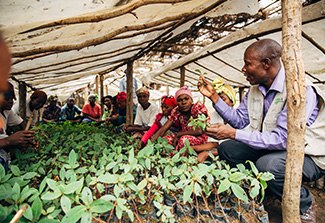Fogarty webinar series highlights food and nutrition insecurity
September / October 2022 | Volume 21 Number 5
 Photo courtesy of Tanya Martineau/USAIDThis webinar series aims to nurture mutual learning between U.S. and international scientists, leading to the development of innovative strategies to address food insecurity.
Photo courtesy of Tanya Martineau/USAIDThis webinar series aims to nurture mutual learning between U.S. and international scientists, leading to the development of innovative strategies to address food insecurity.
Access to nutritious and safe food has become increasingly unreliable for many of the world’s poor. Research on nutrition, food insecurity and health outcomes is now necessary, even crucial, both domestically and abroad. A three-part webinar hosted by Fogarty, “Learning from Global Food/Nutrition Insecurity,” will feature innovative research projects in global settings.
The term "food and nutrition insecurity" describes when someone is unable to access or afford enough food or enough nutritious food for their overall health and well-being. In addition to sharing lessons learned, the webinar aims to identify opportunities for adapting and adopting studies and solutions from various countries and contexts to the United States and elsewhere, where food insecurity affects millions
Researchers and members of the public are welcome to register in advance for the weekly webinar series, which begins the first Thursday in November.
Register to attend the webinar series
“Interdisciplinary research is urgently needed to understand how to convert the current quite unhealthful food systems—to which humans are exposed throughout their lives—into healthy and sustainable ones with equity for all,” said Rafael Pérez-Escamilla, chair of the webinar and professor, Yale School of Public Health.
A U.S. and a global challenge
The U.S. Department of Agriculture estimates 10.2% of American households—about 33.8 million people—were food insecure at some time during 2021. The Food and Agriculture Organization of the United Nations estimated that up to 800 million people in the world faced hunger in 2020. Worldwide, women and people in underserved communities are disproportionately affected and so face potential health consequences, which are wide-ranging and, in some cases, long-term.
Scientists across the globe have developed and tested evidence-based interventions and public health and policy strategies to address drivers of food inaccessibility. “Mutual learning and exchange among domestic and foreign scientists will help lay the groundwork for the development of promising new interventions,” said Susan Vorkoper, a research and policy analyst at Fogarty and creator of the webinar. “The robust research on food and nutrition insecurity in global settings presents an opportunity to learn more about effective strategies and interventions and also to consider the possible implications for our domestic U.S. context.”
Defining and measuring food insecurity
The webinar seeks to define and explore the relationship of food insecurity, diet quality and safety, and eating patterns to diet-related diseases in various international contexts. Attendees will learn about research interventions, methodology, and program initiatives to help address the issue and promote health equity in a variety of settings across different countries. Participants will also evaluate methods on defining and measuring food and nutrition insecurity for use in their own projects. Additionally, the webinar will investigate gaps, challenges, and opportunities for promoting evidence generated by implementation science and disseminating impactful public health interventions.
“The root of food insecurity is social injustice,” said Pérez-Escamilla. “Multisectoral evidence-based equitable policies and programs are needed for attaining food security and the rest of the [United Nations] Sustainable Development Goals.” Pérez-Escamilla will lead the first hour-long webinar session beginning at
10 a.m. ET on November 3. His talk, “Overview of Global Food Insecurity,” will present a conceptual framework that can guide measurement approaches to identify the impacts of food insecurity in various age groups and settings.
Amos Laar of University of Ghana will lead the second hour-and-a-half-long session beginning at
10:30 a.m. ET on November 10. Laar will discuss “Leveraging food environments for food security,” and explore the roles played by home, neighborhood, and community food environments. He will also provide examples of effective food environment and food system interventions across multiple regions that address equity, access, disparities, and sustainability.
The final hour-long session, “Implementation Science and Food/Nutrition Insecurity,” is slated for
November 21 beginning at 3 p.m. ET. University of South Carolina’s Edward Frongillo will explore natural experiments and investigative designs within the disciplines of implementation science. Frongillo, who is also president of the Society for Implementation Science in Nutrition, will also provide an example of a global food insecurity solution that has been adapted across settings.
Webinar sponsors include the National Cancer Institute, the National Heart, Lung, and Blood Institute, the NICHD, the U.S. Agency for International Development, the Centers for Disease Control and Prevention, NIH Office of Disease Prevention and NIH Office of Nutrition Research.
More Information
To view Adobe PDF files,
download current, free accessible plug-ins from Adobe's website.
Related Global Health Research Topics